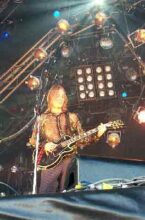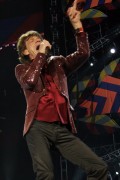Jimmy Kimmel’s return to late-night television after his brief suspension became more than just another monologue, it turned into a pointed commentary on free speech, political intimidation, and the precarious position of comedy in today’s America. His remarks touched on three main themes: the role of Disney and ABC in his suspension and reinstatement, the political pressure exerted by Donald Trump and his allies, and his own reflections on what free expression means in a democracy.
Kimmel began by recounting the outpouring of support he received during his absence. Messages came not only from friends and fellow late-night hosts like Stephen Colbert, John Oliver, Seth Meyers, and Conan O’Brien, but also from figures he rarely agrees with ideologically. Conservatives such as Ben Shapiro, Candace Owens, and even Senator Ted Cruz voiced their opposition to the government attempting to silence him, with Cruz remarking that if authorities can censor Kimmel, it sets a dangerous precedent for everyone. Kimmel, with characteristic irony, admitted that Cruz was “absolutely right.” This bipartisan defence of his right to speak underscored his larger point: freedom of expression is not a partisan privilege but a constitutional cornerstone.
Turning to the controversy that triggered his suspension, Kimmel addressed accusations that he had trivialized a politically charged murder. He insisted that was never his intent, pointing out that he had posted condolences immediately after the tragedy. He explained that while his commentary may have been misinterpreted as partisan blame, he was condemning violence itself. To those hurt by his remarks, he expressed understanding, acknowledging he might have reacted the same way if the roles were reversed. Importantly, he reiterated that the killer “represented no one” but his own sickness, and that violence is never a legitimate solution.
But the heart of Kimmel’s monologue was not personal defence—it was political critique. He described his suspension as the product of direct political pressure from President Trump, who had already celebrated Colbert’s removal from CBS and had turned his sights on Kimmel and others. Trump, he said, “celebrates Americans losing their livelihoods because he can’t take a joke.” Kimmel stressed that this isn’t merely about him or about late-night comedy; it’s about a sitting president weaponizing government power to punish dissenting voices.
The Federal Communications Commission (FCC) became a central target of Kimmel’s ire. He cited FCC chairman Brendan Carr’s threats that networks would face consequences if they didn’t act against Kimmel’s show. What disturbed Kimmel most was the hypocrisy: Carr himself had once defended satire as “one of the oldest and most important forms of free speech.” Now, in power, Carr was threatening the very thing he once celebrated. For Kimmel, this illustrated how quickly democratic safeguards can erode when those in office abandon principle for loyalty.
When Kimmel shifted to Disney’s role, he struck a more complicated tone. On the one hand, he thanked Disney for two decades of creative freedom, saying they had consistently backed his right to push boundaries and criticize political leaders. On the other hand, he admitted he strongly disagreed with Disney’s initial decision to suspend him, making clear that he had argued his case behind the scenes. Ultimately, though, Disney allowed him back on air, a choice he described as courageous because it put the company at risk of further government retaliation. Kimmel acknowledged his relatively small place in the massive Disney empire but emphasized the principle at stake: corporations should not bow to authoritarian pressure to silence criticism of political leaders.
From there, Kimmel widened the lens beyond comedy. He warned that Trump’s attempts to intimidate late-night hosts were part of a broader campaign against journalists. He pointed to new restrictions requiring Pentagon reporters to pledge not to report unauthorized information, including unclassified material—a chilling sign of official censorship. For Kimmel, this was proof that free press and free comedy are bound together: if the government can silence either, the other will soon follow.
True to form, Kimmel balanced his serious commentary with satire. He performed a sketch featuring a mobster-like “new FCC chairman” who enforced speech rules favourable to Trump, lampooning the absurdity of charging comedians “by the word” unless they praised the president. He also mocked Trump’s rambling United Nations speech and ridiculed his odd alliance with Robert F. Kennedy Jr. in claiming Tylenol causes autism, parodying Trump’s repetitive style with an extended refrain of “Don’t take Tylenol.”
Kimmel closed on a note of solidarity and hope. He suggested that perhaps the controversy could unite Americans across ideological divides in defence of free speech. He urged viewers to stop letting politicians dictate the national agenda and instead insist on shared priorities—healthcare, gun safety, cancer research, and other broadly supported issues. He invoked the example of Erica Kirk, the widow who forgave her husband’s killer, as a model of grace and forgiveness Americans might learn from.
In summary, Kimmel’s first show back was less about jokes and more about stakes. He presented his suspension as a warning sign: when a president and his allies try to silence comedians and journalists, democracy itself is under threat. Disney’s role was both flawed and courageous, Trump’s role was vindictive, and Kimmel’s message was clear, free speech is not negotiable, even in late night.
Watch Jimmy Kimmel back on the air and speaking out for Democracy
Stay updated with your free Noise11.com daily music news email alert. Subscribe to Noise11 Music News here
Be the first to see NOISE11.com’s newest interviews and special features on YouTube. See things first—Subscribe to Noise11 on YouTube
Follow Noise11.com on social media:
Bluesky
Facebook – Comment on the news of the day

















